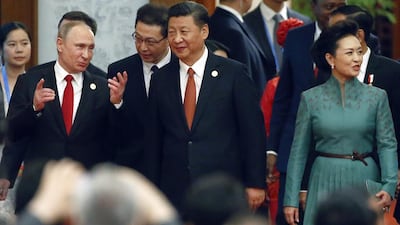BEIJING // China touted its new Silk Road as “a project of the century” on Sunday at a summit in Beijing highlighting its growing leadership on globalisation.
President Xi Jinping hosted leaders from 29 nations for the two-day summit ending on Monday. As many as 81 other countries sent delegations, including the UAE, according to state news agency Wam.
The summit is showcasing Mr Xi’s cherished One Belt, One Road initiative, a revival of the ancient Silk Road trading routes which could further expand China’s growing global influence on trade and geopolitics.
“This is indeed a gathering of great minds,” Mr Xi said, addressing leaders from Russian president Vladimir Putin to Turkish president Recep Tayyip Erdogan and Philippine president Rodrigo Duterte. Few Western heads of government made the trip.
Mr Xi pledged to pump an extra US$124 billion (Dh455.5bn) into the initiative, calling it “a project of the century” in a “world fraught with challenges”.
The Chinese-bankrolled project seeks to link the country with Africa, Asia and Europe through an enormous network of ports, railways, roads and industrial parks.
The initiative spans some 65 countries representing 60 per cent of the world population and around a third of global gross domestic product. The China Development Bank has earmarked $890bn for some 900 projects.
The project could also serve Beijing’s geopolitical ambitions as Washington retreats into “America First” policies.
Attending the summit, Dr Sultan bin Ahmed, Minister of State and chief executive of the Adnoc Group, said: “The United Arab Emirates strongly supports the Belt and Road initiative, which will foster economic growth and stability, both regionally and globally, by encouraging positive cooperation, alignment and true partnership.”
The summit took place as US and South Korean military officials confirmed that Pyongyang had test-fired a ballistic missile. The missile flew more than 700 kilometres before landing in the Sea of Japan.
The US representative at the summit, White House adviser Matt Pottinger, was pictured near North Korea’s minister of external economic relations, Kim Yong Jae, as the two men arrived.
But US embassy spokeswoman Mary Beth Polley said the two officials did not hold a meeting. “No small talk, nothing,” she said.
Mr Xi focused on his initiative, boasting that it represented a “road for peace”, but he cautioned that “all countries should respect each others’ sovereignty ... and territorial integrity”.
He warned that “isolation results in backwardness”.
Praising Mr Xi’s initiative, Mr Putin warned that “protectionism is becoming the norm”.
“The ideas of openness, trade freedom are rejected more and more, very often by those who were their supporters not so long ago,” he said.
Although Mr Trump railed against China’s trade policies during the US presidential election in November last year, he has nurtured friendly ties with Mr Xi and his envoy to Sunday’s summit said American companies were ready to get involved in the Silk Road.
“US firms can offer the best-value goods and services required over the life of a project,” Mr Pottinger told the forum, though he warned that success would depend on transparent government procurement, among other things.
German economy minister Brigitte Zypries echoed calls for transparency to ensure that the calls for bids are “non-discriminatory”.
Some Belt and Road projects are raising concerns in certain countries.
India has voiced displeasure at the China-Pakistan Economic Corridor, a Belt and Road project aimed at linking northwestern China to the Arabian Sea.
The route cuts through Gilgit and Baltistan in Pakistan-administered Kashmir, disputed territory that India claims is illegally occupied.
* Agence France-Presse

